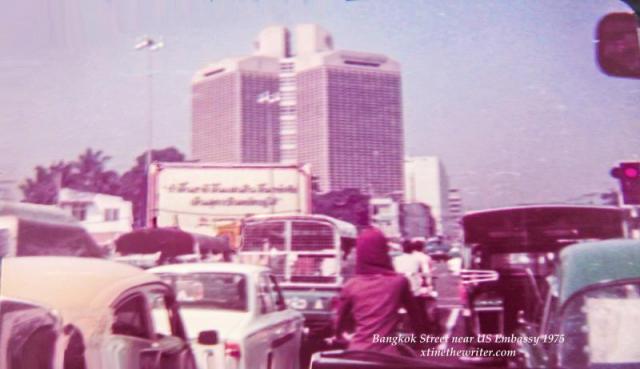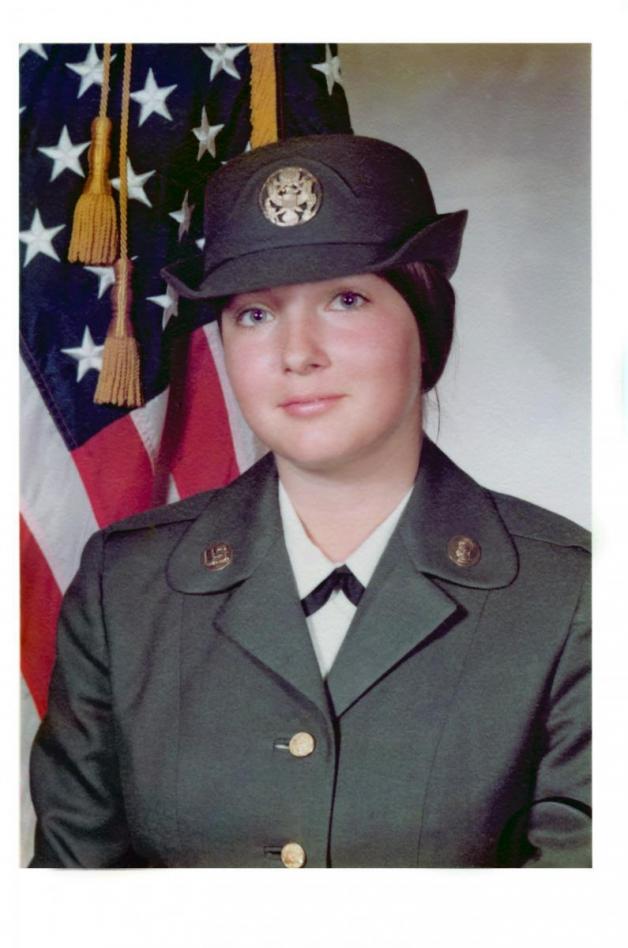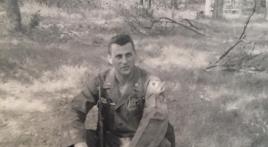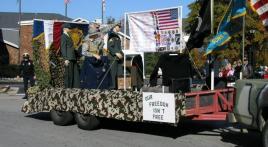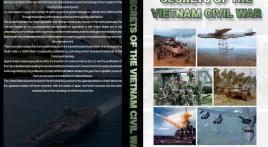My name is Christine Lorraine Morgan and I am a U.S. army vet who was stationed in Bangkok, Thailand during the fall of Saigon, Cambodia and Laos. I worked in the Bangkok Telecommunications Center in the JUSMAG military compound, teletyping and transmitting messages to Washington, D. C. and other parts of the world in 1975-76.
This tale doesn't seem very scary in the big picture of War, especially when you consider how many brave men and women have lost their lives over the centuries in battle. Upon reflection, though, it has occurred to me that maybe it is a frightening tale in a different sort of way, because when this occurred we were completely unarmed. Beyond that insurmountable obstacle, we were totally unprepared and untrained to even begin to know how to deal with a dangerous politically-motivated situation such as this.
My fellow soldiers and I were on "low-profile" duty and weren't permitted to wear uniforms. This was to avoid attracting attention to ourselves as the political climate in Bangkok was unrestful due to insurgents trying to whip up anti-American sentiment. There were thousands of posters displayed around the city showing an American eagle shot full of little arrows, which was somewhat intimidating. Our plane landed in that nation the exact day it was announced that the US was initiating evacuations of Americans and their families, which was also rather frightening.
One sunny afternoon, our Thai bus driver, who was transporting us across the city to our 2nd shift work duty location, was told to be sure to avoid a huge Anti-American protest in front of the US Embassy, where insurgents were urinating on our flag and burning it as well. Either he didn't understand or he didn't care, but either way, he drove the busload of us low-profile enlisted soldiers straight to the embassy where our bus was abruptly stopped amidst the throng of protesters.
Complicating matters was the fact that our bus was green and had the letters U.S. Army printed on the sides.
As our vehicle came to a complete standstill, we were looking around the bus at each other's faces. It seemed to dawn on us all at once that no one on the bus was armed or possessed any sort of protection beyond our own hands. I also realized that nowhere in my extensive training did anyone ever explain what to do in this particular situation, probably because it wasn't supposed to happen.
My 18-year-old brain began scrambling, trying to figure out a solution to this frightening and unforeseen potentially violent scenario.
Sounds of thumping surrounded us. The bus began rocking. I shouted to my co-workers, who were just as shocked and stunned as I was, "What should we do?" I screamed.
Someone yelled, "Lay down on the floor and try to hide!"
So we all slid out of our seats and laid on the floor, prayerful and silent, hoping we would somehow survive this ordeal. How does one hide from thousands of angry people in a foreign country when trapped on a bus and there is nowhere to go?
The bus's rocking intensified, and from my filth-covered spot beneath the seat I was sweating profusely as I begged the Lord for forgiveness, thinking I might be killed at any moment. It had occurred to me that by this time, the protesters had noticed that this was a US Army bus because it felt like they were trying to flip the bus onto its side. The exterior slamming sounds continued as heavy items were probably being slung at us, those American soldiers whose flag deserved to be defiled.
I just laid there, helpless, heart pounding into my throat, despising the driver who had led us into this nest of danger. Just as I was thinking of him and his foolish move, I heard the bus door open and braced myself for the worst. Then I heard the door close again and lifted my head enough to see the driver was gone. He had exited the bus and left us even more alone than we were before.
I felt thankful that he had closed the somewhat flimsy door behind him to keep out the angry mob, but was worried at what his intentions were. Was he going to sell us out? Did he wish us to suffer? Was he aligned with the protesters? Why did he bring us here when he was specifically warned not to do so?
After what felt like an eternity of bus-pounding and rocking, the door opened again, and I could hear a chorus of angry Thai voices shouting. The smells of sulfur, gasoline, and things burning wafted in and I seriously began to fight some kind of deep panic welling up inside of me. I lifted my head again to see who or what was on the horizon.
The bus driver returned, alone, and I felt a slight shiver of hope as he stepped up into the vehicle and sat down in the driver's seat. I almost felt a dash of relief until several of the protesters followed him in, waving their arms, and yelling foreign words that I could not understand from their post where they were clustered near the front of the bus.
The driver started the engine, then he stood up and sharply spoke back to the individuals who had followed him on to the bus. To this day, I wish I knew what he said to deflate them, because after his scolding they turned around and reluctantly left. He then closed the door, shifted gears, and proceeded to drive forward painfully slowly, while the bus continued to be pelted, slapped, slammed and otherwise accosted.
After several minutes we cleared the Embassy and were able to continue on our way to work over the crowded streets on our regular route.
Fifteen minutes later we were delivered to our place of employment, weak-kneed and filthy from taking refuge on the litter-laden bus floor for what seemed like hours, although it had probably only been 30 minutes or so.
To this day I have no idea what the bus driver's motives were: Was he acting maliciously or did he just not understand the route he was supposed to follow? How did he elude the protest and manage to drive us out of there without any violence toward us soldiers directly other than pounding and rocking the bus? What was said between him and the protesters?
These questions will go down in the category of life's mysteries. I guess it doesn't really matter after all, considering that I am here to tell the tale.
Thank you for affording me the privilege of sharing this story. And thank you to my fellow service members who have suffered through similar and much worse experiences to preserve American freedom.
